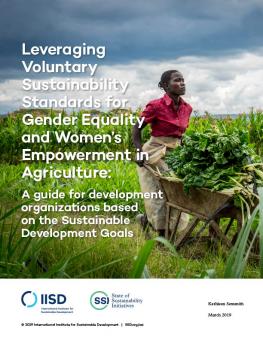
Leveraging Voluntary Sustainability Standards for Gender Equality and Women's Empowerment in Agriculture: A Guide for Development Organizations Based on the Sustainable Development Goals
Our report, available in English and French, explains how voluntary sustainability standards (VSSs) can be used as a tool to meet the SDGs and targets related to gender equality and women’s empowerment in agriculture.
Key Messages
- Voluntary sustainability standards (VSSs) can contribute indirectly to household food security and gender equality in food access through sustainable production practices that contribute to a diverse and nutritional diet, and by potentially contributing to higher incomes generated from certification.
- Financial supports provided through certification, such as pre-financing or premiums, can contribute to women’s ability to access productive inputs and credit, when producer organizations support these measures enhancing women’s rights to productive agricultures resources.
- Certification through VSSs can alleviate some of women’s domestic labour burdens through financial support for labour-saving investments, equipment and technologies.
Systemic gender inequalities and the disempowerment of women persist in agricultural production across the Global South.
For instance, rural households face significant food security concerns, and women and girls face unequal access to the calories that are available. Implementing VSSs can provide opportunities to enhance women’s economic empowerment, improve food security and achieve the United Nations Sustainable Development Goals (SDGs).
VSSs have the potential to make significant contributions to sustainable development due to their influence on certification criteria and implementing procedures with farmers and agricultural communities.
Our report, available in English and French, explains how VSSs can be used as a tool to meet the SDGs and targets related to gender equality and women’s empowerment in agriculture. It also provides recommendations for development organizations working toward that goal. Specifically, the report analyzes how VSSs:
- Can be leveraged to make positive contributions to gender equality
- Can promote gender equality depending on certain conditions
- Can exacerbate gender inequalities if not undertaken with sensitivity to local gender dynamics.
You might also be interested in
The Responsible Agricultural Investment Tool for Agribusiness and Case Studies
This report summarizes a collaboration to support agribusinesses in complying with principles of responsible investment in agriculture and food systems.
Promoting the Development of Agricultural Cooperatives
Governments in the Global South should promote agricultural cooperatives to boost smallholder access to fair markets, finance, and climate resilience.
Women Turning the Table on Food Loss and Waste in Kenya
A group of changemakers led a movement to tackle food loss and waste in Kenya. IISD experts have been working closely with local women leaders to make change happen.
Agreement on Climate Change, Trade and Sustainability: A landmark pact for trade and sustainability
The ACCTS pact, signed by Costa Rica, Iceland, New Zealand, and Switzerland, aligns trade and environmental policies, tackling fossil fuel subsidies, eco-labels, and green trade.